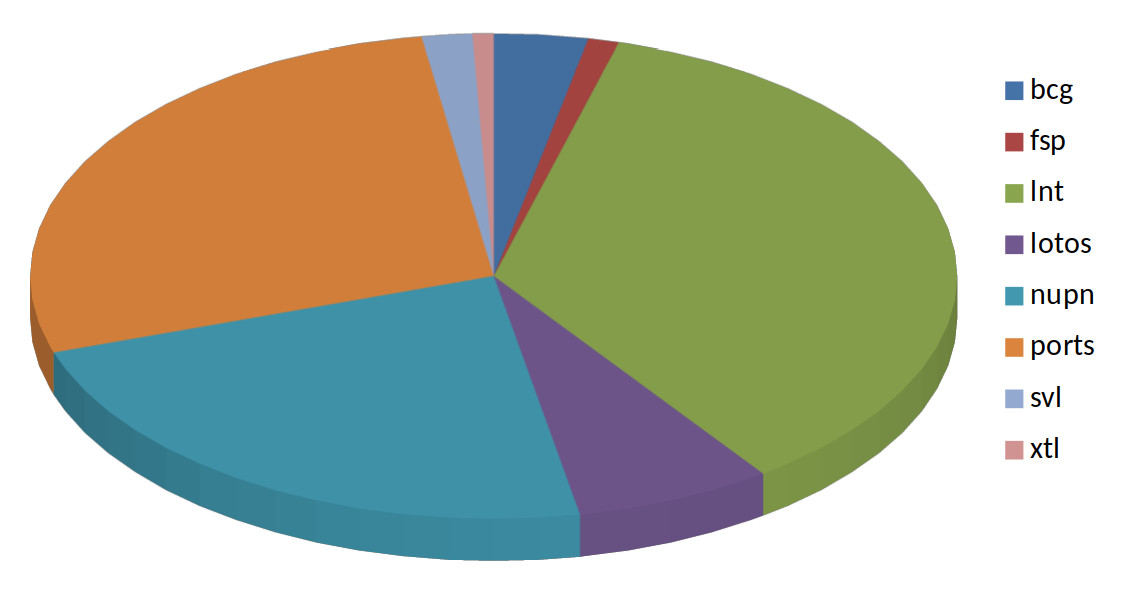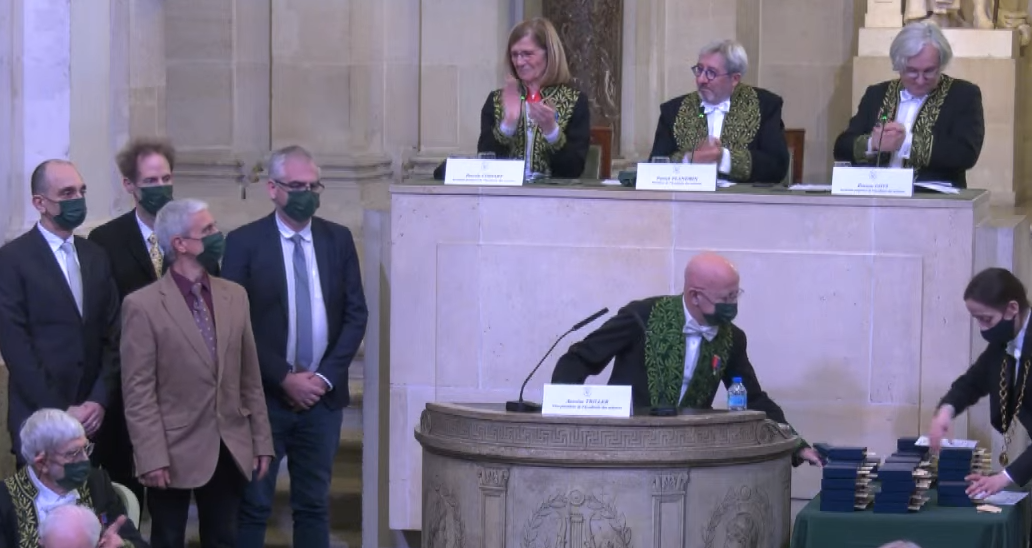This section summarizes the main enhancements in the various components of
CADP. For more details, please refer to the CADP
- BCG
-
In addition to a bug fix in the ALDEBARAN script (which calls BCG_MIN and
BCG_CMP) and two bug fixes in BCG_EDIT, the implementation of sharp reduction
in BCG_MIN was enhanced by using a new signature-based partition-refinement
algorithm that computes sharp-equivalence classes and performs full
minimization with respect to sharp bisimulation, thus replacing the
partial-reduction algorithm formerly implemented in BCG_MIN.
The BCG_CMP tool was also enhanced with this new algorithm so to compare two
labelled transition systems modulo sharp bisimulation.
For details, see HISTORY entries:
#2693 #2694 #2708 #2710 #2729
- FSP
-
The FSP2LOTOS compiler now accepts the definition of local processes named
ERROR or STOP, but only if they have a non-empty set of parameters.
For details, see HISTORY entries:
#2659
- LNT
-
The LNT language has continued its evolution to become a better language
and to achieve convergence with the LOTOS NT language
supported by the TRAIAN compiler.
The priority rules for LNT infix operators have changed to reduce the need
for parentheses and make LNT expressions closer to mathematical notations.
The predefined LNT operator for string concatenation, formerly noted "+", was
renamed to "&", which is the notation used in LOTOS NT, but also in Ada,
AppleScript, and VisualBasic. The predefined function "is_empty" was
renamed to "IsEmpty". The syntax of the "case" instruction was
simplified by removing an extra "in" keyword. All LNT pragmas of the
form !representedby "xxx" are now deprecated and replaced
by pragmas of the form !implementedby "LOTOS:xxx".
Also, the pragmas of the form !implementedby "xxx" can
be equivalently written !implementedby "C:xxx",
meaning that xxx is an identifier of the C language
(same for !comparedby, !printedby, and !iteratedby).
In addition to seven bug fixes in LNT2LOTOS, one bug fix in LNT_DEPEND, and
one bug fix in UPC, the LNT2LOTOS translator has been refined to emit new
warnings about ambiguous or potentially erroneous situations: expressions
combining different infix Boolean operators without parentheses; expressions
combining different user-defined infix operators without parentheses;
expressions using user-defined operators such as "AND", "And", "OR", etc.
that do not enjoy the same precedence as the builtin operators "and", "or",
etc.; patterns using "any T" without parentheses on the left-hand side of
an infix operator; channel fields that are not given names; etc.
The LNT2LOTOS Reference Manual has been updated to document the changes of
LNT, and the CADP demo examples have been upgraded to the latest version of
LNT. Also, the demos 07, 08, 09, 20, 34, 37, and 39 of CADP have been
translated from LOTOS to LNT.
The "upc" shell script was extended to ease the migration of LNT programs.
These can be upgraded (automatically or semi-automatically) by invoking,
in that order, the following commands:
upc 2021-LNT-PRIORITIES <directory>
upc 2021-LNT-UPPER-INFIX <directory>
upc 2021-LNT-ISEMPTY <directory>
upc 2021-LNT-CASE-VAR <directory>
upc 2021-LNT-REPRESENTEDBY <directory>
upc 2021-LNT-CHANNELS <directory>
upc 2021-LNT-ANY <directory>
For details, see HISTORY entries:
#2652 #2654 #2655 #2657 #2660 #2661 #2665 #2667 #2669 #2670 #2671 #2705
#2706 #2707 #2716 #2717 #2720 #2725 #2730 #2735 #2738 #2739 #2740 #2741
#2742 #2743 #2744 #2745 #2748 #2753 #2754 #2755
- LOTOS
-
In addition to 5 bug fixes, the CAESAR and CAESAR.ADT compilers now reject
C identifiers that collide with the reserved keywords of the C99 and C11
versions of the C language, and generate C code that complies with the
activation by default of the "-fno-common" option in Gcc 10.
For details, see HISTORY entries:
#2675 #2678 #2679 #2680 #2697 #2700 #2737 #2747
- NUPN
-
In addition to three bug fixes, the CAESAR.BDD tool was enhanced in
multiple ways.
New internal data structures have been introduced to store the transitions
going in and out of each place. Although this new implementation consumes
more memory, it is (usually two times) faster on large NUPNs.
The BDD exploration of reachable markings was made more efficient by no
longer attempting to fire transitions known to be dead.
The standard "sift" strategy for the dynamic reordering of BDDs has been
replaced with a more efficient strategy ("group sift"), in which only
the binary variables that encode the same NUPN unit can be permuted during
reordering. Also, a new criterion (based on the number of BDD nodes
rather than on the number of transitions) to enable dynamic reordering has
been introduced, which better reflects the intrinsic complexity of a NUPN.
These changes, combined to other enhancements, increased the performance of
many CAESAR.BDD options, including "-concurrent-places", "-concurrent-units",
"-dead-places", "-dead-transitions", "-mcc", "-trivial", etc., which have
been made faster and, possibly, more precise.
CAESAR.BDD now accepts NUPNs with an empty initial marking.
It has been also extended with three new options "-place-order",
"-transition-order", and "-unit-order" intended to characterize NUPNs that
are equivalent modulo net isomorphism. These options have been continuously
improved during year 2021 in order to better detect symmetries.
In addition to three bug fixes, the NUPN_INFO tool was enhanced in various
ways. Its Awk code was made simpler and more modular by factoring fragments
of code shared by several options. The tool was significantly extended
to put NUPNs under a canonical form that helps detecting duplicate models
in large collections of Petri nets and NUPNs.
Two new options "-essential-nupn", which removes pragmas and labels from
NUPNs, and "-precanonical-nupn" have been added to NUPN_INFO.
Six new options "-place-permute", "-place-renumber", "-transition-permute",
"-transition-renumber", "-unit-permute", and "-unit-renumber" have also been
added.
Three new options "-place-sort", "-transition-sort", and "-unit-sort"
(which reuse the results computed by the options "-place-order",
"-transition-order", and "-unit-order" of CAESAR.BDD) have also been
added to NUPN_INFO.
The behaviour of the "-canonical-nupn" option of NUPN_INFO has been
strengthened by invoking all the aforementioned options in combination,
and a new option "-normal-nupn" was added to retain the former
behaviour of the "-canonical-nupn" option.
The manual pages for CAESAR.BDD, NUPN_INFO, and the NUPN format have been
updated accordingly and modified at various places to resolve ambiguities.
For details, see HISTORY entries:
#2653 #2681 #2682 #2683 #2684 #2685 #2686 #2687 #2688 #2689 #2690 #2691
#2692 #2695 #2698 #2699 #2702 #2703 #2718 #2719 #2721 #2731 #2733 #2734
#2749 #2750 #2751 #2757 #2759 #2760 #2761
- PORTS
-
In addition to nine bug fixes (including two in EUCALYPTUS, two in
INSTALLATOR, and two in TST), the CADP tools have been enhanced in
many ways.
The CADP tools (as well as the CADP, CONVECS, and VASY web sites) have been
updated to use, whenever possible, the HTTPS protocol instead of the FTP
and HTTP protocols.
CADP no longer uses "compress" and ".Z" files as its default compression.
Installator now uses "gzip", and support for "xz" compression was added.
INSTALLATOR no longer proposes the obsolete protocols RSH and RCP.
RFL now supports the Oarsh/Oarcp commands for deployment on large
clusters, such as Grid 5000.
Concerning Linux: CADP was adapted to support recent Linux distributions
based on Glibc 2.32. Various changes were done to avoid warnings emitted
by versions 7, 8, 9, and 11 of the Gcc compiler. The TST script prints
finer information about virtualization and hypervisors and the user's
preferred browser is now automatically detected. A new documentation file
INSTALLATION_LINUX was added.
Concerning macOS: CADP was ported to macOS 11 "Big Sur" and macOS 12
"Monterey". Also, various changes were made to avoid warnings that
appeared with Xcode 13 and XQuartz 2.8.1. The instructions for installing
CADP on macOS have been updated and simplified.
Concerning Windows: CADP was adapted to work on the Linux distributions
available from the Microsoft Store and running on top of Windows/WSL2
(Windows Subsystem for Linux); both X servers VcXsrv and KeX are supported.
Also, the Windows/Cygwin version of CADP was enhanced by using Microsoft
Edge by default for HTML and PDF documents, and by avoiding an issue with
the version 4.4.12(3) of GNU bash currently shipped with Cygwin. Support
for the obsolete versions 7 and 8 of Windows was dropped.
For details, see HISTORY entries:
#2656 #2662 #2663 #2664 #2666 #2668 #2672 #2673 #2674 #2676 #2677 #2701
#2704 #2711 #2712 #2713 #2714 #2715 #2722 #2723 #2724 #2726 #2727 #2728
#2732 #2736 #2746 #2752 #2756 #2758 #2762
- SVL
-
In addition to one bug fix, the SVL language, the SVL compiler, and their
manual pages have been extended to support comparison of LTSs modulo sharp
bisimulation, which was recently introduced in BCG_CMP.
For details, see HISTORY entries:
#2658 #2696
On November 23, 2021, during a solemn ceremony at the French Academy of
Sciences, Hubert Garavel, Frédéric Lang, Radu Mateescu, and
Wendelin Serwe received, the Innovation Prize of Inria - Académie
des Sciences - Dassault Systèmes.
We are extremely grateful to the following scientists, who provided us with
valuable feedback and advice about the use of CADP:
and all other persons we may forget.




 Back to the CADP Home Page
Back to the CADP Home Page